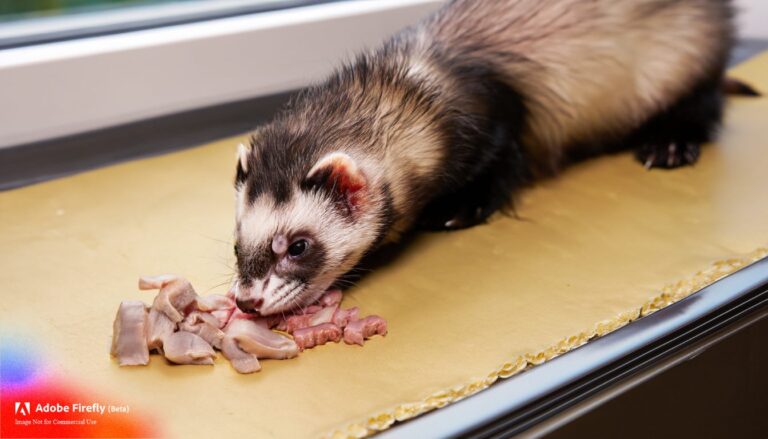
If you’re a fan of furry critters and have been considering adding a ferret to your family, you may be wondering: can you own a ferret in Australia? Well, I’m here to shed some light on this intriguing topic. As an expert in animal ownership regulations, I’ve done my fair share of research on the subject. So, let’s dive in and explore the fascinating world of ferret ownership down under.
Australia is renowned for its unique wildlife, but when it comes to exotic pets, the rules can be quite strict. While some countries allow ferrets as pets without any restrictions, Australia has its own set of regulations in place. In this article, I’ll break down the legalities surrounding ferret ownership in Australia, including the states where they are permitted and the specific conditions you’ll need to meet. So, if you’re eager to find out if you can bring home a playful and mischievous ferret companion, keep reading to discover the answer.
The Rules of Ferret Ownership in Australia
When it comes to owning a ferret in Australia, there are specific rules and regulations that you need to be aware of. While some countries allow ferrets as pets without any restrictions, Australia takes a more cautious approach to their ownership.
First and foremost, it’s important to note that ferrets are not permitted in all states in Australia. Currently, ferrets are allowed as pets in Queensland, South Australia, Tasmania, and the Australian Capital Territory. However, they are restricted or prohibited in New South Wales, Victoria, Western Australia, and the Northern Territory.
Even in the states where ferrets are allowed, there are certain conditions that need to be met in order to legally own one. These conditions vary depending on the state, so it’s crucial to familiarize yourself with the specific requirements in your area. Here are some key points to consider:
- Microchipping and Vaccination: In most states where ferrets are permitted, they must be microchipped and vaccinated against diseases such as distemper and rabies. This is done to ensure the safety of both the animal and the community.
- Desexing: Desexing, also known as spaying or neutering, is often a requirement for owning a ferret in Australia. This is done to prevent unwanted breeding and control the ferret population.
- Caging Requirements: Many states have specific regulations regarding the housing of pet ferrets. This includes the size and dimensions of the enclosure, as well as the provision of appropriate bedding, hiding spots, and environmental enrichment.
- Permit and License: Some states may require you to obtain a permit or license to own a ferret. This is to ensure that only responsible and informed individuals are keeping these animals as pets.
By following these rules and regulations, you can legally own a ferret in Australia and provide a safe and suitable environment for your furry friend. It’s important to remember that these laws are in place to protect the welfare of the animals and maintain the ecological balance in the country.
Now that we’ve covered the rules of ferret ownership in Australia, let’s move on to discussing the benefits of having a ferret as a pet.
Permitted States in Australia for Owning a Ferret
When it comes to owning a ferret in Australia, it’s essential to be aware of the regulations in your specific area. While the laws regarding ferret ownership differ between states, there are certain states in Australia where owning a ferret is permitted. Let’s take a closer look at these states:
- Australian Capital Territory (ACT): In ACT, keeping a ferret as a pet is legal and does not require any specific permits or licenses. However, it’s still important to ensure that you meet all the necessary care and welfare requirements for your furry friend.
- New South Wales (NSW): Owning a ferret in NSW is allowed, but there are some conditions that need to be met. First, you must obtain a permit from the local council or the Department of Primary Industries. Additionally, it is essential to have your ferret microchipped, vaccinated, and desexed. By fulfilling these requirements, you can legally keep a ferret in NSW.
- Queensland (QLD): In QLD, owning a ferret as a pet is also permitted. However, it’s crucial to obtain a permit from the Department of Environment and Science within 28 days of acquiring your ferret. This permit ensures that you comply with the necessary regulations and take responsible ownership.
- Victoria (VIC): Similar to QLD, VIC requires a permit for owning a ferret. The Department of Environment, Land, Water, and Planning issues these permits. Additionally, VIC has specific requirements for ferret breeders and sellers to maintain the welfare and protection of these animals.
It’s important to remember that these regulations may change over time, so it’s always a good idea to check with your local authorities for the most up-to-date information. By understanding and following the rules in your state, you can enjoy the companionship of a ferret while ensuring their safety and well-being. Next, we will explore the benefits of having a ferret as a pet.
Conditions for Owning a Ferret in Australia
When it comes to owning a ferret in Australia, there are certain conditions that need to be met. It’s important to familiarize yourself with these requirements to ensure you can legally and responsibly own a ferret. Here are the key conditions you need to be aware of:
1. Microchipping: One of the conditions for owning a ferret is that they must be microchipped. This helps to identify them and can be crucial in reuniting them with their owner if they become lost. Make sure to choose a reputable veterinarian who can properly microchip your ferret.
2. Vaccination: Just like any other pet, ferrets also need to be vaccinated. Vaccinations not only protect your ferret’s health but also play a role in preventing the spread of diseases. Consult with your veterinarian to ensure your ferret receives the necessary vaccinations.
3. Desexing: In most states in Australia, it is mandatory to desex your ferret. Desexing helps control the ferret population and can also have health benefits for your pet. It’s best to have this procedure done by a qualified veterinarian.
4. Caging Requirements: Another condition for owning a ferret is ensuring they have appropriate caging. Ferrets require a spacious and secure enclosure, preferably with multiple levels, ramps, and hiding spots to keep them active and engaged. It’s important to provide a clean and comfortable living space for your ferret.
5. Permits or Licenses: Some states in Australia require permits or licenses to own a ferret. These permits ensure that ferret owners are responsible and informed about the laws and regulations regarding ferret ownership. Check with your local authorities to understand the specific permits or licenses required in your area.
It’s important to note that while ferrets are permitted in certain states in Australia, there may still be local council restrictions or other regulations you need to be aware of. Stay updated on any changes to the regulations to ensure you are adhering to the necessary conditions for owning a ferret in Australia.
Consequences of Illegally Owning a Ferret in Australia
As much as we may be tempted to have a furry little ferret friend, it’s important to understand the consequences of owning one illegally in Australia. The laws and regulations surrounding ferret ownership are in place for a reason, and violating them can lead to some serious consequences. Here’s what you need to know:
- Fines and Penalties: Owning a ferret in a state where it is illegal can result in hefty fines and penalties. The exact amount can vary depending on the state and circumstances, but it’s not something you want to take lightly. Authorities take these regulations seriously and can enforce strict penalties to deter illegal ownership.
- Confiscation of your Ferret: If you are caught with an illegal ferret, there is a high chance that your furry companion will be confiscated and taken away from you. This can be heartbreaking, not only for you but also for the poor ferret. They may be placed in a shelter or rehomed, depending on the local regulations and availability of suitable facilities.
- Damaging Wildlife and Ecosystems: One of the main reasons why ferrets are regulated in Australia is their potential to harm native wildlife and fragile ecosystems. Ferrets are known for their predatory nature, and if released or allowed to escape, they can cause devastating impacts on local fauna and flora. By owning a ferret responsibly and legally, we can help protect our unique environment.
- Unavailability of Vet Care and Insurance: Since ferrets are considered illegal in some states, it may be challenging to find proper veterinary care and pet insurance coverage for your furry friend. It’s important to note that some veterinarians may be hesitant to provide care for illegally owned animals due to legal concerns. This can make it difficult to ensure the health and well-being of your ferret.
It’s crucial to understand that the regulations in place are designed to protect both the native wildlife and the welfare of these adorable creatures. If you’re passionate about owning a ferret, it’s essential to abide by the laws in your state and ensure you have the necessary permits and licenses. Remember, educating yourself about the legalities and responsibly caring for your pet is crucial to maintaining the well-being of both your ferret and the environment around you.
Conclusion
Owning a ferret in Australia comes with its own set of regulations and requirements. It is crucial to familiarize yourself with the specific conditions in your area, such as microchipping, vaccination, desexing, caging requirements, and permits or licenses. In Australia, owning a ferret is permitted in certain states, including the Australian Capital Territory (ACT), New South Wales (NSW), Queensland (QLD), and Victoria (VIC). Each state has its own regulations and permits that need to be adhered to.
It is important to understand the consequences of illegally owning a ferret in Australia. This includes facing fines and penalties, having your ferret confiscated, and potentially causing harm to wildlife and ecosystems. Additionally, without the necessary permits and licenses, access to vet care and insurance may be limited.
To responsibly care for a ferret in Australia, it is essential to abide by the laws and ensure that you have obtained the required permits and licenses. By doing so, you can enjoy the companionship of a ferret while ensuring the safety and well-being of both the ferret and the environment.






